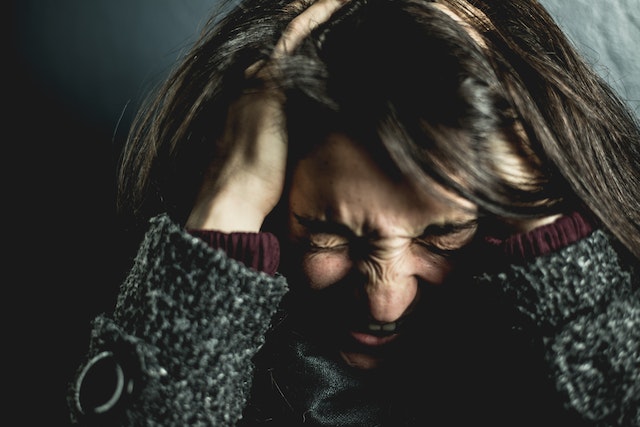
Image Source: Unsplash
Anxiety is a common mental health issue that affects millions of people worldwide. Whether you experience occasional moments of anxiousness or have been diagnosed with an anxiety disorder, finding effective and natural remedies to alleviate anxiety symptoms is crucial for promoting mental well-being. In this comprehensive guide, we will explore ten natural remedies that have been shown to reduce anxiety and provide relief. From lifestyle changes to herbal supplements and relaxation techniques, there are various approaches you can incorporate into your daily routine to manage anxiety effectively.
1. Exercise: The Power of Physical Activity
Regular exercise has been widely recognized for its positive impact on mental health, including reducing anxiety symptoms. Engaging in physical activity releases endorphins, also known as “feel-good hormones,” which can help improve mood and alleviate anxiety. Studies have shown that both moderate-intensity exercises like brisk walking and high-intensity exercises like running or cycling can have significant benefits in reducing anxiety levels. Incorporating regular exercise into your routine can help relieve stress and promote overall mental well-being.
2. Mindfulness and Meditation: Cultivating Inner Calm
Mindfulness and meditation techniques have gained popularity for their ability to reduce anxiety and promote relaxation. These practices involve focusing your attention on the present moment and cultivating a non-judgmental awareness of your thoughts and emotions. By training your mind to stay present and observe your thoughts without getting caught up in them, you can develop a greater sense of calm and reduce anxiety. Deep breathing exercises, guided imagery, and body scan meditations are some techniques that can help you incorporate mindfulness into your daily life.
3. Herbal Supplements: Nature’s Remedy
Certain herbal supplements have shown promise in reducing anxiety symptoms and promoting relaxation. Chamomile, lavender, and passionflower are well-known herbs that have been traditionally used for their calming properties. Chamomile, in particular, has been studied for its effectiveness in reducing symptoms of generalized anxiety disorder (GAD). While more research is needed to determine the exact dosage and safety profile of these herbs, they can be consumed in the form of teas, extracts, or supplements. It is important to consult with a healthcare professional before starting any herbal supplements, especially if you are taking other medications.
4. Breathing Techniques: Finding Serenity in Every Breath
Deep breathing exercises can be a simple yet powerful tool to alleviate anxiety symptoms. When we are anxious, our breathing tends to become shallow and rapid, which can further contribute to feelings of stress and panic. By consciously slowing down your breath and taking deep, diaphragmatic breaths, you can activate the body’s relaxation response and reduce anxiety. Techniques like box breathing, where you inhale, hold, exhale, and hold your breath in equal counts, can help regulate your breathing and promote a sense of calm.
5. Aromatherapy: The Healing Power of Scents
Aromatherapy involves the use of essential oils to promote well-being and relaxation. Certain scents have been found to have a calming effect on the mind and body, making them effective in reducing anxiety. Lavender, ylang-ylang, and bergamot are popular essential oils known for their anxiety-reducing properties. You can use essential oils by inhaling them directly, using a diffuser, or applying diluted oils to your skin. However, it’s important to note that essential oils are potent and should be used with caution. Always dilute them properly and consult with a qualified aromatherapist or healthcare professional.
6. Omega-3 Fatty Acids: Nourishing the Brain
Omega-3 fatty acids are essential nutrients that play a crucial role in brain health. Found in fatty fish like salmon, mackerel, and sardines, as well as in flaxseeds and walnuts, these healthy fats have been linked to a reduced risk of anxiety and depression. Research suggests that omega-3 supplementation may help alleviate anxiety symptoms, especially in individuals diagnosed with specific anxiety disorders. Incorporating omega-3-rich foods into your diet or considering omega-3 supplements can be beneficial for promoting mental well-being.
7. Journaling: Unleashing Your Thoughts on Paper
Journaling can be a therapeutic practice that helps you explore and process your thoughts and emotions. Putting pen to paper allows you to externalize your worries and anxieties, making them feel more manageable. Research has shown that journaling, particularly emotion-based journaling, can reduce mental distress and improve overall well-being. By regularly journaling about your thoughts, feelings, and experiences, you can gain insights into your anxiety triggers and develop strategies to cope effectively.
8. Time Management and Stress Reduction Techniques: Finding Balance
Managing your time effectively and implementing stress-reduction techniques can be instrumental in reducing anxiety. Feeling overwhelmed by a long to-do list or multiple commitments can contribute to heightened anxiety levels. By prioritizing tasks, breaking them down into manageable steps, and practicing stress reduction techniques like deep breathing or taking short breaks, you can regain a sense of control and reduce anxiety. Time management strategies, such as creating schedules and setting realistic goals, can help you stay organized and alleviate anxiety related to time constraints.
9. Cognitive Behavioral Therapy: Changing Your Thought Patterns
Cognitive-behavioral therapy (CBT) is a widely recognized and evidence-based approach for treating anxiety disorders. CBT focuses on identifying and changing negative thought patterns and behaviors that contribute to anxiety. By challenging irrational thoughts and replacing them with more realistic and positive ones, you can shift your perspective and reduce anxiety. CBT can be conducted individually with a therapist or through self-help resources, such as books or online programs. Seeking the guidance of a qualified mental health professional can provide valuable support and guidance throughout the process.
10. Social Support and Connection: Building Strong Relationships
Social support and connection are essential for maintaining good mental health and reducing anxiety. Spending time with loved ones, engaging in meaningful conversations, and participating in social activities can provide emotional support and a sense of belonging. Sharing your feelings and experiences with trusted friends, family members, or support groups can help alleviate anxiety by providing a space for validation and understanding. Building a support network and nurturing positive relationships can contribute to your overall well-being and resilience in the face of anxiety.
In conclusion, managing anxiety in natural and holistic ways is possible by incorporating various strategies into your daily life. From exercise and mindfulness practices to herbal supplements and stress reduction techniques, there are numerous options to explore. It’s important to remember that what works for one person may not work for another, so be patient and open to trying different approaches. If your anxiety symptoms persist or significantly impact your daily life, it is essential to seek professional help from a healthcare provider or mental health professional. Together, you can develop a personalized plan to effectively manage anxiety and promote your mental well-being.



